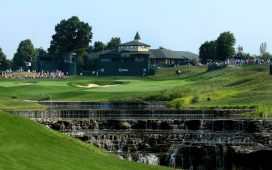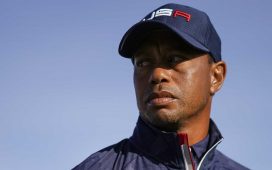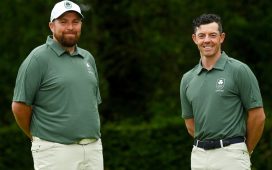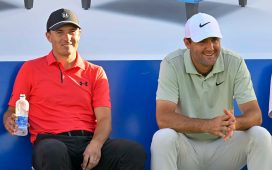The Masters, as its name might convey, has the smallest field in men’s major championship golf by a considerable margin. The United States Open, British Open, and P.G.A. Championship all have 156-player fields, while Augusta National almost never extends invitations to more than 100 players — and prefers to stay comfortably below that mark.
The club annually builds a list of qualifications as a selection criteria that takes into account golfers’ results over the year all the way up to the week preceding the tournament, an April-to-April measure. This year, that method did not change despite the Masters having been postponed seven months to November, locking in a field of 96 players before many of golf’s most notable tournaments took place.
Notably excluded are Viktor Hovland, a former U.S. Amateur winner ranked in the top 25, and Daniel Berger, who rose from 106th in the world rankings in February to a figure this fall as high as 13th, the average ranking of Masters winners over the last decade. “I’m not sure what else I have to do at this point to get into Augusta,” he said in August. “I’m a little baffled that I haven’t had more opportunity to at least hear from some of the guys over there and have a chance, obviously.” Berger won June’s Charles Schwab Challenge to gain a spot in the 2021 Masters field, where he’ll challenge one of these potential winners.
The Favorites
Bryson DeChambeau
Tee times: Thurs., 7:33 a.m. | Friday 11:38 a.m. Odds: 9/1
DeChambeau’s aggressive bomb-and-gouge strategy, replete with 350-to-400-yard drives, has made him an early focus of the 2020 Masters. But his weight and distance gains also compelled him to contend at the year’s first two major championships: He finished tied for fourth at the P.G.A. Championship in August, his first top-10 finish at a major, and throttled the U.S. Open field for his first major win.
The “mad scientist” may experiment this week with a 48-inch driver in his pursuit of long-ball domination, but DeChambeau’s putting could ultimately determine his finish. The notoriously methodical DeChambeau usually pores over green-reading books before his putts on the PGA Tour, a practice that’s a no-no at the Masters. He has struggled to putt well there in the past, with his best finish coming in 2016 when he tied for 21st as an amateur.
With DeChambeau and his booming drives as the headliner this week, it’s no wonder that Fred Ridley, Augusta National’s chairman, noted that “we are at a crossroads as it relates to this issue.” Ridley added that Augusta National would support any action by the game’s governing bodies, who are still in the process of a multiyear distance study, but that the game at the professional level is “coming closer to a call to action.”
Ridley pumped the brakes on talks of adapting the course to the long ball. “I’ve been reluctant thus far to make any major changes regarding adding distance to the golf course,” Ridley said on Wednesday. ”I think sometimes when you do that, I mean, I think there are unintended consequences that come out of that. The scale and the scope of the hole, it changes when you add distance. It changes more than just adding distance. The look of the hole changes. And the design philosophy of the hole changes.”
Rory McIlroy
Tee times: Thurs., Noon | Fri., 7:55 a.m. Odds: 12/1
DeChambeau’s distance carnival is attracting most of the attention this week, which should sit well with McIlroy. Entering Masters week, he’s usually the focus of nagging questions about his tortured history with the tournament, the lone major he’s never won.
McIlroy has had a steady — but not spectacular — year by his standards. It adds to the relative quiet around what will be his 12th crack at the Masters, where his best finish (fourth) was in 2015. McIlroy has tried multiple approaches in both mental and golf preparation for what is normally the first major of the season. Perhaps the untraditional setup of this Masters coming at the end of the year, with no fans, and the attention on several other contenders could change the dynamic enough for him to nab the white whale of his hall of fame career.
Jon Rahm
Tee times: Thurs., 7:33 a.m. | Fri., 11:38 a.m. Odds: 12/1
Rahm is a supreme talent who has succeeded almost immediately at every stage of his golf career. He achieved No. 1 in the world rankings earlier in 2020 and comes into the Masters closing on Dustin Johnson for the current top spot.
In 16 starts at the majors, he has four top-10 finishes, including two at each of the last two Masters. He’s a favorite this year and should be at all majors in future years, especially if he’s able to string together rounds as joyous as his practice sessions this week. Rahm aced the fourth and 16th holes, the latter by skipping the ball over the surface of the water feature.
Tee times: Thurs., Noon | Fri., 7:55 a.m. Odds: 14/1
Johnson has sat comfortably at the top of the world rankings for months and won 23 times on the PGA Tour, an astounding number in this modern era. But given those results, having one major championship to his name is often characterized as a disappointment. He’s back at the Masters as the world No. 1 this year, but he had to sit out two preparatory starts in October after testing positive for the coronavirus. Upon his return at the Houston Open the week preceding the Masters, Johnson said his health was “good” but his game was “undetermined.”
Justin Thomas
Tee times: Thurs., 11:49 a.m. | Fri., 7:44 a.m. Odds: 14/1
This has been a standard year for Thomas, and standard for him means multiple wins, a top-five world ranking, consistent top-10 finishes, and an argument for the Player of the Year Award. He is a deserved favorite, despite finishing outside the top 10 in his first four Masters starts, because he possesses all the requisite tee-to-green metrics to contend.
Notably Questionable
Brooks Koepka
Tee times: Thurs., 11:49 a.m. | Fri., 7:44 a.m. Odds: 20/1
The most steady player at the men’s major championships arrives at the 2020 Masters after a year of injury troubles. In August, Koepka withdrew from the PGA Tour’s Playoffs and the U.S. Open in September, removing himself from a major he’s won twice and would have been a favorite at this year.
Koepka’s injuries go back to last fall, when he initially had stem-cell treatment for a partially torn patellar tendon in his left knee. That knee pain lingered into this year and led to the onset of a labrum injury as he struggled to shift his weight onto his left side. He returned to the Tour in October to make two pre-Masters starts with a knee and hip he said felt “a million times better” than at the start of the year. He already has an impressive 10 top-five finishes at major championships, but his runner-up result at the 2019 Masters was his first show of contention at Augusta. It’s perilous to discount Koepka at any major, but his tenuous health has cast doubt on what shape he’ll be in to compete.
Tiger Woods
Tee times: Thurs., 7:55 a.m. | Fri., Noon Odds: 35/1
Woods enjoyed an extra seven-month reign as the defending Masters champion but he has not demonstrated much in 2020 to suggest he’s ready to extend that title into next April. He made eight official starts on the PGA Tour this calendar year, with the best result coming in January in a tied-for-ninth finish at the Farmers Insurance Open.
Since the PGA Tour resumed in June, his best finish was a tie for 39th at the P.G.A. Championship. The underlying statistics have also been troubling: Woods’s putting statistics over the summer were some of the worst of his career, leading to putter tinkering and an outright putter change at one point.
More recently, and perhaps more concerning, are his strokes gained tee-to-green numbers. At the Zozo Championship, he ranked 70th out of 77 players in the statistic. The putter can be fickle and improve overnight, but Woods is the greatest iron and approach game player of all time, and it’s an especially vital statistic at the Masters, where the last five winners have been no worse than third in strokes-gained approach. As he showed at the 2019 Masters, Woods just needs four days at Augusta, where he knows how to win better than anyone in the field.
Jordan Spieth
Tee times: Thurs., 8:06 a.m. | Fri., 12:11 p.m. Odds: 60/1
Spieth may be the only person in the field who can approximate Woods’s feel and knowledge of how to succeed at Augusta. He has the most strokes gained per round in the history of the event, ahead of Ben Hogan and Woods. He’s been so successful competing at the Masters and already has so much history over the last six years at the tournament that it is sometimes forgotten that he’s won it only once.
Spieth, the 2015 Masters champion, will need the magic to click again when he walks onto the grounds, as his form and his world ranking have been in a sustained tumble. Since the end of 2018, he’s dropped from No. 15 to No. 75. “There’s a lot that’s off,” Spieth said at the U.S. Open in September. “I’m not really sure. If I knew, I’d fix it.”
All times are Eastern.








